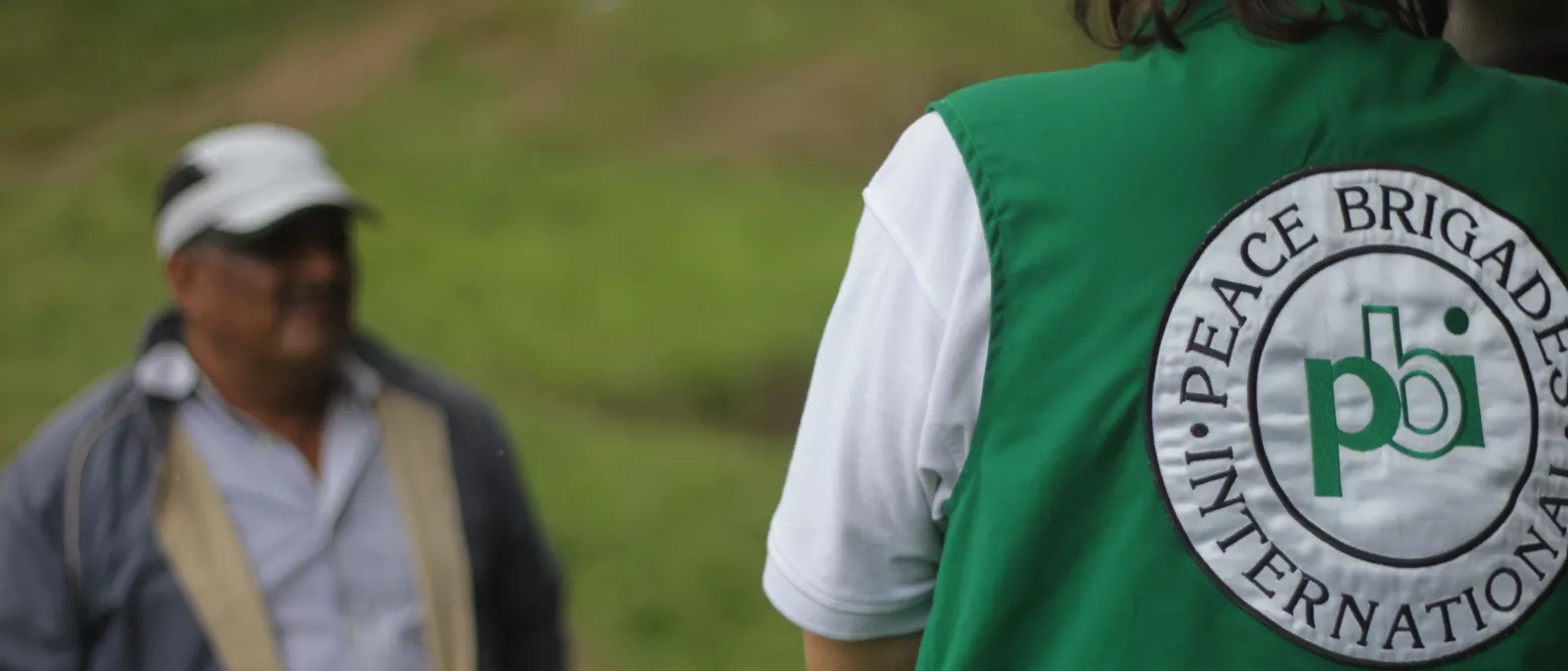
Peace Brigades International
‘We are forming an organisation with the capacity to mobilise and provide trained volunteers in areas of high tension, to avert violent outbreaks. Peace brigades, fashioned to respond to specific needs and appeals, will undertake nonpartisan missions, which may include peacemaking initiatives, peacekeeping under a discipline of nonviolence, and humanitarian service. …We are building on a rich and extensive heritage of nonviolent action. We are convinced that this commitment of mind, heart, and dedicated will can make a significant difference in human affairs.’
The idea to start Peace Brigades International came from people with practical experience of nonviolence. Especially relevant was the earlier work of the Shanti Sena peace army in India and the World Peace Brigades.
On 12 January 1981 a letter signed by Narayan Desai (Shanti Sena Mandal), Raymond Magee (Peaceworkers), Piet Dijkstra (Foundation for the Extension of Nonviolent Action), Radhakrishana (Gandhi Peace Foundation) and George Willoughby was sent out to a number of organisations. It invited them to attend a conference to revive the idea of an international organisation committed to unarmed third party intervention in conflict situations.
This led to a meeting that took place on Grindstone Island, Canada from 13 August to 4 September 1981, attended by Raymond Magee, Lee Stern, Henry Wiseman, Murray Thomson, Narayan Desai, Gene Keyes, Charles Walker, Dan Clark, Mark Shepard and Jaime Diaz.
The meeting approved a founding statement and a structure: a directorate of 4 people, and a General Assembly of approximately 25 people with subcommittees to develop different areas of work. The following name emerged to general approval upon first being voiced by Narayan Desai: PEACE BRIGADES INTERNATIONAL.
The first work PBI did was in Nicaragua. In September 1983, 10 PBI volunteers maintained a short presence in Jalapa, close to the Honduran border, placing themselves between US-backed contras and the Sandinista forces in order to deter hostilities. That same year PBI installed its first team in Guatemala. In the following years, PBI provided accompaniment to organisations and human rights defenders in El Salvador, Sri Lanka, Colombia and Haiti.
PBI currently maintains field projects in Colombia, Guatemala, Honduras, Indonesia, Kenya, Mexico and Nepal and 14 country and associated groups in Europe, America and Oceania.
At the international level, PBI is composed of an International Secretariat which is made up of the International Council (IC), the International Operations Council (IOC), and the International Office located in Brussels (Belgium). The highest decision-making body of PBI is the General Assembly (GA), which meets every three years. The GA is made up of volunteers and staff representatives from PBI country groups and projects.
Vision
PBI envisions a world in which people address conflicts non-violently, where human rights are universally upheld and social justice and intercultural respect have become a reality.
Mission
PBI works to open a space for peace in which conflicts can be dealt with non-violently. We use a strategy of international presence and concern that supports local initiatives and contributes to developing a culture of peace and justice. We act at the request of local non-violent groups working for human rights and social change in regions where there is oppression and conflict.
The aim of PBI’s international presence is to accompany both political and social processes through a joint strategy of deterring violence and promoting active non-violence. Our international teams of volunteers use methods such as protective accompaniment, peace education, independent observation and analysis of the conflict situation. In addition, PBI learns about, develops, and models forms of nonviolent intervention. Where possible, we initiate contacts with all the parties to a conflict in order to inform them of our presence. PBI supports this work through a broad international network of organisations and individuals.
Our identity is built upon non-hierarchical structures and consensus-based processes.
Approved by the General Assembly of PBI, Sweden, 1998.
General principles
NonviolencePBI is committed to giving the highest consideration to human life and its defence. It respects everyone’s basic human rights, democratic values and freedoms.
PBI is convinced that enduring peace and lasting solutions to conflicts between and within nations cannot be achieved by violent means and therefore it rejects violence of any kind and from any source. PBI aims to support the processes of building a peaceful society by encouraging cooperation between groups working in democratic ways and striving to find political solutions to conflicts by nonviolent means.
International CharacterPBI is a global organisation. It represents the concerns of the international community in relation to conflicts and crises which affect everyone, and to peace which benefits everyone.
PBI respects the autonomy and the right of self-determination of all people, and sees its services as a complementary contribution to their own efforts for peace-making. Hence it avoids imposing or interfering with their own ways of thinking and acting. As a corollary of this approach PBI goes into a situation only if requested by the concerned people in the area.
Non-PartisanshipAs an international third-party actor, PBI acts in an independent and non-partisan manner. Non-partisanship does not mean indifference, neutrality or passivity towards injustice or towards violation of human rights, personal dignity and individual freedom. On the contrary: PBI is fully committed to these values and struggles against violence - physical or structural - as a means of establishing enduring peace.
HorizontalityPBI uses a non-hierarchical model of organising and decision-making, which places importance on relationships and processes and not just on outcomes.
Approved by the General Assembly in Ontario (Canada), June 1992, amended by the General Assembly, Manenbach (Switzerland), November 2001, amended by the General Assembly, Hamburg (Germany), 2008.
For more information on PBI’s global work, please visit the Peace Brigades International website.
